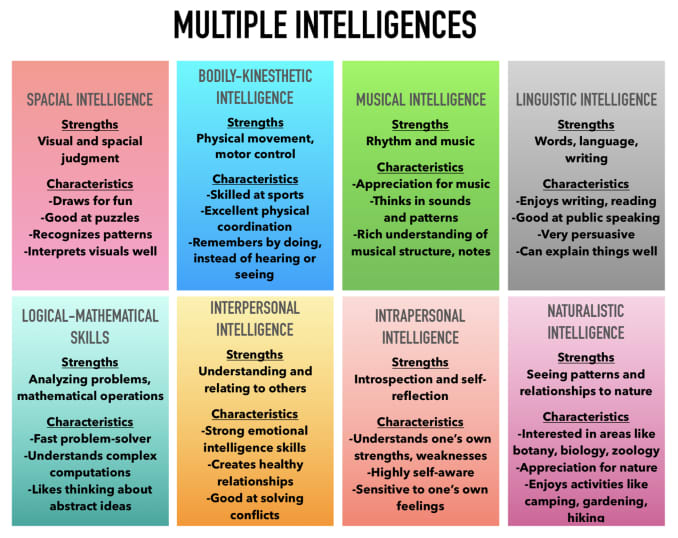A Harvard Psychologist Claims:
We’re not all naturally skilled at the same things. Some are more athletic and have better coordination. Some pick up on language and words faster at a young age, while others are good with numbers and visualizing patterns.But most people don’t fully understand their range of abilities, and as a result, may end up in the wrong careers. Or, they might enjoy their jobs, but struggle to identify effective learning techniques that will help them excel further.
The theory of multiple intelligences
To get a better sense of your skills and capabilities, I often recommend starting with the theory of multiple intelligences.
First introduced in his 1983 book “Frames of Mind,” Howard Gardner, a psychologist and professor at Harvard University, states that there are eight types of human intelligence — each representing different ways of how a person best processes information.

Howard Gardner’s Theory of Multiple Intelligences
Credit: Kumar Mehta, CNBC Make It
How high you score in one category does not necessarily influence how (high or low) you score in another.
If you want to learn to be exceptional at something, your best bet is to understand the unique areas of intelligence where you have an advantage, and then build upon those strengths.
For example, consider someone who struggled with writing until they attempted to create a graphic story, which turned into a compelling narrative. Or a student who couldn’t seem to grasp fractions until they visualized separating apples into slices.
Below are the eight types of intelligence identified by Gardner. As you go through each, score yourself on a scale of one (doesn’t come naturally) to five (comes very naturally). READ MORE
To get a better sense of your skills and capabilities, I often recommend starting with the theory of multiple intelligences.
First introduced in his 1983 book “Frames of Mind,” Howard Gardner, a psychologist and professor at Harvard University, states that there are eight types of human intelligence — each representing different ways of how a person best processes information.

Howard Gardner’s Theory of Multiple Intelligences
Credit: Kumar Mehta, CNBC Make It
How high you score in one category does not necessarily influence how (high or low) you score in another.
If you want to learn to be exceptional at something, your best bet is to understand the unique areas of intelligence where you have an advantage, and then build upon those strengths.
For example, consider someone who struggled with writing until they attempted to create a graphic story, which turned into a compelling narrative. Or a student who couldn’t seem to grasp fractions until they visualized separating apples into slices.
Below are the eight types of intelligence identified by Gardner. As you go through each, score yourself on a scale of one (doesn’t come naturally) to five (comes very naturally). READ MORE


No comments:
Post a Comment